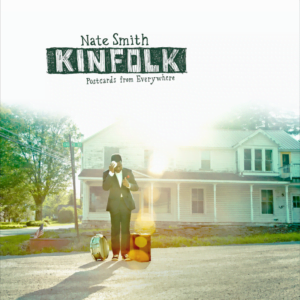 Nate Smith‘s visceral, instinctive, and deep-rooted style of drumming has already established him as a key piece in reinvigorating the international jazz scene, and now his rising career reaches a new benchmark with the release of his bandleader debut, KINFOLK: Postcards from Everywhere (Feb. 3, 2017 via Ropeadope Records). Much like his diverse and ample resume (which includes esteemed leading lights such as Dave Holland, Chris Potter, Ravi Coltrane, José James, Somi, and Patricia Barber, among others), this album sees Smith fusing his original modern jazz compositions with R&B, pop, and hip-hop.
Nate Smith‘s visceral, instinctive, and deep-rooted style of drumming has already established him as a key piece in reinvigorating the international jazz scene, and now his rising career reaches a new benchmark with the release of his bandleader debut, KINFOLK: Postcards from Everywhere (Feb. 3, 2017 via Ropeadope Records). Much like his diverse and ample resume (which includes esteemed leading lights such as Dave Holland, Chris Potter, Ravi Coltrane, José James, Somi, and Patricia Barber, among others), this album sees Smith fusing his original modern jazz compositions with R&B, pop, and hip-hop.This leader debut shows Smith at the helm of a core ensemble consisting of pianist and keyboardist Kris Bowers, guitarist Jeremy Most, alto and soprano saxophonist Jaleel Shaw, electric bassist Fima Ephron, and singer/lyricist Amma Whatt, with Michael Mayo on backing vocals. The lineup expands on several cuts with the inclusion of several illustrious guests: saxophonist Chris Potter, bassist Dave Holland, guitarists Lionel Loueke and Adam Rogers, and vocalist Gretchen Parlato.
“KINFOLK is about the musical family that I’ve put together,” Smith said in a recent news release. “All core members of the band have very unique and specific points of view.”
He reinforces the idea of family by composing tunes that touch upon his childhood: such is the case with the jovial “Morning and Allison,” whose title partly invokes Allison Drive, the street on which Smith grew up. The song stars Whatt serenading idyllic recollections of a child enjoying a bright, fun-filled Sunday morning.
Smith recorded his parents – Lettie and Theodore Smith – talking about their respective parents on the mesmerizing interludes “Mom” and “Dad.” On the former, Smith’s mother tells how her father migrated from Virginia to Detroit and was drafted into U.S. Army, then later returned to Virginia where he bought the family a house. The latter provides a vehicle for Theodore to recall how his own father tirelessly worked at Navy shipyard in Norfolk, Virginia during the Jim Crow era without getting proper financial compensation or promotion until decades later.
“I think of these stories as snapshots that ultimately gave shape to the Black American experience into which I was born, which ultimately informs this music,” Smith said. He stressed the significance of having his father on the disc: Theodore Smith passed away in March 2015.
“He never got a chance to hear the music or the band,” Smith said.
Because Smith didn’t come strictly from the formal matriculation of music studies as so many of his jazz contemporaries did, he lovingly describes his approach to drumming as “unrefined,” which in turns helps him distinguish his voice. He did, however, earned his bachelor’s degree in 1997 in media arts and design from James Madison University. While he was still in college, the legendary singer Betty Carter recruited him for her world-acclaimed Jazz Ahead program.
Smith said that the visual arts discipline he studied in college definitely seeps into his compositions.
“I love great movies and images. I’ve always had a deep interest in composing for film,” he said. “For this project, there is something very cinematic about the way that I conceived this record. That’s why it was so important for me to cast the right characters in terms of musicians. They bring to life the themes of family, nostalgia and identity that define this music.”
Ultimately, Smith likens the songs on KINFOLK to film vignettes sequenced together to tell a greater story about the unfolding journey of a working artist. This music represents snapshots from that voyage – these songs are the postcards from everywhere along the winding road.